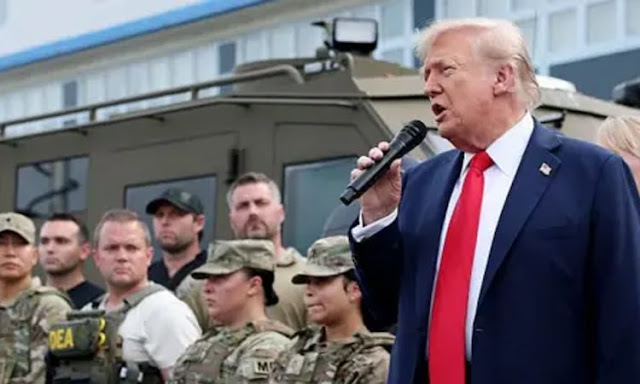In a provocative escalation of his ongoing confrontation with Democratic leaders, U.S. President Donald Trump has threatened to deploy National Guard troops to Baltimore, Maryland, as part of his high-profile crackdown on crime and immigration. The announcement, made via a post on Truth Social, described Baltimore as an “out of control, crime-ridden” city and suggested that federal intervention would “quickly clean up the Crime.” The move has sparked a heated exchange with Maryland Governor Wes Moore, who accused Trump of resorting to “1980s scare tactics” and invited the president to witness Baltimore’s progress firsthand. This development is part of a broader national clash between Trump and Democratic governors, with cities like Chicago and New York also facing potential federal military intervention. The controversy raises critical questions about the use of military force in domestic law enforcement, the state of crime in American cities, and the political motivations behind Trump’s actions.
The Truth Social Post and Baltimore’s Response
On August 24, 2025, President Trump took to his social media platform, Truth Social, to issue a pointed threat aimed at Baltimore and Maryland Governor Wes Moore. In his post, Trump described Baltimore as an “out of control, crime-ridden” city and offered to deploy National Guard troops if Moore “needs help, like Gavin Newscum did in L.A.,” using a derogatory nickname for California Governor Gavin Newsom. The reference to Los Angeles alludes to Trump’s earlier deployment of nearly 5,000 troops to the city in June 2025 to quell protests against immigration enforcement actions, a move that drew fierce opposition from Newsom and other Democratic leaders. Trump claimed that federal intervention in Baltimore would mirror the recent deployment of troops to Washington, D.C., and would “quickly clean up the Crime.”
Governor Moore responded swiftly and sharply, accusing Trump of reviving outdated and inflammatory rhetoric. In a post on X, Moore quipped, “Hey Donald, we can get you a golf cart if that makes things easier,” inviting the president to join him for a walk through Baltimore to see the city’s progress. Moore highlighted significant reductions in crime under his administration, noting that Baltimore’s homicide rate has fallen by more than 20 percent since he took office. “The last time the homicide rate was this low in Baltimore City, I was not born yet,” he added, emphasizing the city’s achievements in reducing gun violence and other crimes.
Trump countered with a personal attack on Moore’s record, stating that he would “much prefer that he clean up this Crime disaster before I go there for a ‘walk.’” The president also threatened to withhold federal funding for the reconstruction of the Francis Scott Key Bridge, which collapsed in 2024, tying the issue to his ongoing feud with Moore. This exchange underscores the personal and political dimensions of the conflict, with both leaders using public platforms to assert their positions and rally their respective bases.
The Broader Context: Trump’s Crackdown on Democratic Cities
The Baltimore controversy is part of a larger pattern of confrontations between Trump and Democratic-led cities, as the president pursues an aggressive agenda to address what he describes as rampant crime and immigration issues. Earlier in August 2025, Trump deployed approximately 2,000 National Guard troops to Washington, D.C., and took temporary control of the city’s police department, citing a need to combat a purported wave of lawlessness. This move, which bypassed local elected leaders, was described as an unprecedented assertion of presidential power and drew fierce criticism from Democrats, who labeled it an “abuse of power.”
The Washington deployment set a precedent for Trump’s broader strategy, which includes targeting other Democratic strongholds. On August 22, 2025, Trump signaled that Chicago could be the next city to face federal military intervention, telling reporters in the Oval Office, “We’re going to make our cities very, very safe. I think Chicago will be our next and then we’ll help with New York.” This statement followed reports that the Pentagon has been planning a military deployment to Chicago for weeks, with discussions about mobilizing National Guard units from Republican-led states and potentially using active-duty troops for force protection.
Illinois Governor JB Pritzker and Chicago Mayor Brandon Johnson have vehemently opposed the idea of federal troops in their city. Pritzker, in a post on X, accused Trump and his MAGA supporters of falsely portraying their party as one of “law and order,” arguing that such deployments are an attempt to “manufacture a crisis” for political gain. Johnson echoed these sentiments, stating that he had not received formal communication about troop deployments and warning that such actions would be “uncoordinated, uncalled for, and unsound.” He emphasized that federal intervention could undermine local efforts to reduce crime, which have resulted in an 8 percent decrease in homicides in Chicago in 2024 compared to the previous year.
The Los Angeles Precedent and National Guard Deployments
Trump’s reference to Los Angeles in his Truth Social post points to a significant earlier deployment that has shaped the current controversy. In June 2025, the president ordered nearly 5,000 National Guard troops and Marines to Los Angeles to address protests against immigration enforcement actions. The deployment, which was carried out over the objections of Governor Newsom, sparked a legal battle, with California officials challenging the federalization of the state’s National Guard. A federal judge ultimately ruled in Trump’s favor, affirming his authority to deploy troops under certain conditions.
The Los Angeles deployment highlighted the tensions between federal and state authority, particularly in Democratic-led states. Newsom accused Trump of “hoping for chaos” to justify further crackdowns, arguing that the use of military force was disproportionate and politically motivated. The deployment also raised concerns about the militarization of domestic law enforcement, with critics pointing to the Posse Comitatus Act of 1878, which limits the use of federal military forces in civilian law enforcement. To circumvent these restrictions, Trump has utilized Title 32 Section 502F authority, which allows National Guard troops to assist federal missions while remaining under state command and control, thus avoiding legal constraints.
The Washington, D.C., deployment further escalated these concerns. On August 11, 2025, Trump announced the deployment of 800 National Guard troops to the capital, along with a temporary takeover of the Metropolitan Police Department. By August 24, the number of troops had increased to approximately 2,000, with Defense Secretary Pete Hegseth authorizing them to carry weapons, a significant shift from their initial unarmed status. The troops, drawn from Republican-led states such as South Carolina and West Virginia, have been stationed at high-profile locations like the National Mall, often in areas with low crime rates, leading to accusations that the deployment is more about political optics than addressing actual crime.
Crime Statistics and the Debate Over Necessity
A central point of contention in this controversy is the discrepancy between Trump’s portrayal of cities like Baltimore, Chicago, and Washington, D.C., as “crime-ridden” and the actual crime statistics reported by local authorities. In Baltimore, Governor Moore and Mayor Brandon Scott have touted significant reductions in crime, with homicides down by 22 percent and non-fatal shootings reduced by 19 percent in the first six months of 2025 compared to the previous year. Moore noted that Maryland’s overall homicide rate has decreased by more than 20 percent since his inauguration, marking some of the lowest crime rates in decades.
Similarly, in Washington, D.C., violent crime has decreased significantly, with a 26 percent drop in 2025 compared to 2024, according to the Metropolitan Police Department (MPDC). Robbery is down 28 percent, and homicides have fallen by 12 percent, with 2024 recording the lowest violent crime levels in 30 years. In Chicago, police data shows a reduction in homicides from 617 in 2023 to 573 in 2024, an 8 percent decrease, reflecting ongoing local efforts to address crime. These statistics challenge Trump’s narrative of a crime epidemic, prompting critics to argue that his deployments are politically motivated rather than grounded in evidence.
Democratic leaders have seized on these figures to question the necessity of federal intervention. Washington, D.C., Mayor Muriel Bowser has pointed to a “huge decrease in crime” and described the city’s violent crime rate as being at a 30-year low. A poll conducted by the Washington Post and Schar School found that nearly 80 percent of D.C. residents oppose both the deployment of federal officers and the National Guard, as well as the takeover of the local police department. Similarly, Chicago Mayor Johnson has argued that federal intervention could “inflame tensions” and undermine local progress in reducing crime.
Political Motivations and Democratic Pushback
The deployment of National Guard troops to Democratic-led cities has fueled accusations that Trump is using military force for political purposes. Critics, including Democratic governors and mayors, argue that the president is targeting cities with large Black populations and strong Democratic voting records to project a “law and order” image ahead of future elections. Posts on X have echoed this sentiment, with users like @nigroeneveld describing Trump’s actions as an “occupation by another name” aimed at Democratic strongholds rather than genuine crime-fighting efforts. Others, such as @ReallyAmerican1, have labeled the deployments as a step toward fascism, warning that Trump’s actions could set a precedent for militarizing other cities.
Democratic leaders have been vocal in their opposition. Illinois Governor JB Pritzker accused Trump of “attempting to manufacture a crisis” to distract from his administration’s failures, while Boston Mayor Michelle Wu responded to threats from Attorney General Pam Bondi by urging the administration to “stop attacking our cities.” Los Angeles Mayor Karen Bass described Trump’s earlier deployment to her city as a “test case” for further overreach, warning that it undermines the role of local law enforcement. Democratic House Minority Leader Hakeem Jeffries has also weighed in, asserting that Trump lacks the legal authority to deploy troops to cities like Baltimore and Chicago, particularly given the reported declines in crime.
The involvement of Republican-led states in these deployments has further heightened tensions. Troops from states like South Carolina, West Virginia, and others have been mobilized to support Trump’s initiatives, often under Title 32 authority, which allows them to assist federal missions without violating the Posse Comitatus Act. Additionally, up to 1,700 National Guard troops are set to be deployed across 19 states, primarily Republican-controlled, to support Immigration and Customs Enforcement (ICE) operations, further blurring the lines between immigration enforcement and crime crackdowns. The White House has insisted that these deployments are separate from Trump’s crime-focused operations, but critics argue that the overlap in rhetoric and objectives suggests a coordinated effort to target Democratic cities.
Legal and Ethical Concerns
The use of National Guard troops for domestic law enforcement has raised significant legal and ethical concerns. The Posse Comitatus Act of 1878 restricts the use of federal military forces in civilian law enforcement, except in cases authorized by Congress or the Constitution. Trump’s administration has navigated these restrictions by using Title 32 authority, which allows National Guard troops to operate under state control while supporting federal missions. However, the deployment of troops to Democratic-led cities, often against the wishes of local officials, has sparked debates about federal overreach and the erosion of state autonomy.
Legal challenges have already emerged. In California, a federal trial began in August 2025 to determine whether Trump’s deployment of troops to Los Angeles violated U.S. law, particularly given Governor Newsom’s opposition. While the court ruled in Trump’s favor, the case highlighted the contentious nature of federalizing state National Guard units. Critics argue that such deployments risk militarizing domestic law enforcement, undermining the role of local police and escalating tensions between communities and authorities.
Ethically, the deployments raise questions about the appropriate use of military force in civilian contexts. The presence of armed National Guard troops in cities like Washington, D.C., has been criticized as disproportionate, particularly in areas with low crime rates. Residents like Shawana Turner, a housing case manager in Washington’s high-crime Ward 8, have expressed frustration that troops are stationed in tourist-heavy areas rather than neighborhoods where they are needed most. The visible presence of troops, often mingling with tourists and posing for selfies, has led to accusations that the deployments are more about political theater than effective crime reduction.
The Immigration Angle
Trump’s crackdown is not limited to crime but also encompasses immigration enforcement, a key pillar of his administration’s agenda. The deployment of 1,700 National Guard troops across 19 states to support ICE operations, including tasks like data collection, fingerprinting, and photographing detainees, reflects the administration’s focus on immigration. Attorney General Pam Bondi has indicated that cities with sanctuary policies, which limit cooperation with federal immigration authorities, could be targeted for further deployments, prompting pushback from Democratic mayors like Boston’s Michelle Wu.
The conflation of crime and immigration in Trump’s rhetoric has drawn criticism for perpetuating stereotypes and inflaming racial tensions. Critics argue that the administration’s focus on immigration enforcement, particularly in cities with large minority populations, is a deliberate attempt to appeal to its political base. The deployment of troops to support ICE operations, even in administrative roles, raises concerns about the militarization of immigration enforcement and its impact on community trust.
Public and Political Reactions
Public reaction to Trump’s deployments has been mixed, with significant opposition in Democratic-led cities. In Washington, D.C., a Washington Post and Schar School poll found that nearly 80 percent of residents oppose the National Guard deployment and the federal takeover of the police department. In Baltimore, Mayor Brandon Scott has emphasized the city’s progress in reducing crime, arguing that local efforts should be supported rather than undermined by federal intervention.
On X, sentiment is similarly polarized. Some users, like @ZeekArkham, argue that Democratic cities are facing law enforcement staffing shortages due to local policies, justifying federal intervention. Others, like @BillKristol, warn that Trump’s actions are laying the groundwork for a broader seizure of control over local police in blue cities, describing it as a move toward a “police state.” These posts reflect the broader national divide, with Trump’s supporters viewing the deployments as necessary for restoring order, while critics see them as an authoritarian overreach.
The Path Forward: Challenges and Opportunities
The controversy surrounding Trump’s threat to deploy National Guard troops to Baltimore and other cities highlights several critical issues facing the United States. First, it underscores the tension between federal and local authority, particularly in a polarized political climate. Democratic governors and mayors argue that local law enforcement, supported by community-based strategies, is best equipped to address crime, while Trump’s administration insists that federal intervention is necessary to tackle what it perceives as a national crisis.
Second, the deployments raise questions about the appropriate role of the military in domestic affairs. The use of National Guard troops, particularly when armed, risks escalating tensions and alienating communities, especially in cities with histories of strained police-community relations. Critics argue that resources would be better allocated to supporting local police departments, addressing root causes of crime like poverty and unemployment, and investing in community programs.
Third, the conflation of crime and immigration in Trump’s rhetoric complicates the debate. While the administration frames its deployments as a response to both issues, the focus on immigration enforcement has drawn accusations of racial targeting and political posturing. Addressing these concerns will require a more nuanced approach that separates immigration policy from local crime-fighting efforts and prioritizes community trust.
For Baltimore, the immediate challenge is navigating the political and practical implications of Trump’s threat. Governor Moore and Mayor Scott have emphasized the city’s progress in reducing crime, but they must also prepare for the possibility of federal intervention. Engaging with community stakeholders, strengthening local law enforcement, and advocating for federal support in the form of resources rather than troops could help mitigate the impact of any deployment.
Nationally, the controversy highlights the need for a broader conversation about crime, governance, and federal-state relations. Trump’s supporters argue that his actions are a necessary response to urban challenges, while critics warn of the dangers of militarization and political overreach. Bridging this divide will require dialogue, transparency, and a commitment to evidence-based policies that prioritize the safety and well-being of all Americans.
Conclusion: A Nation at a Crossroads
President Donald Trump’s threat to deploy National Guard troops to Baltimore marks a significant escalation in his administration’s crackdown on crime and immigration, setting the stage for further confrontations with Democratic-led cities. The sharp exchange with Governor Wes Moore, coupled with similar tensions in Chicago, Washington, D.C., and Los Angeles, underscores the deep political divisions shaping the national discourse. While Trump frames his actions as a necessary response to crime, critics argue that they are politically motivated and risk undermining local governance and community trust.
The controversy also raises broader questions about the role of the military in domestic law enforcement, the balance between federal and state authority, and the intersection of crime and immigration policy. As cities like Baltimore continue to make progress in reducing crime through local efforts, the imposition of federal troops could disrupt these gains and exacerbate tensions. The coming months will be critical in determining whether Trump’s strategy leads to meaningful change or further polarization, with implications for the future of American cities and the nation as a whole.






